Mises, Ludwig von. Human Action: A Treatise on Economics
Подождите немного. Документ загружается.

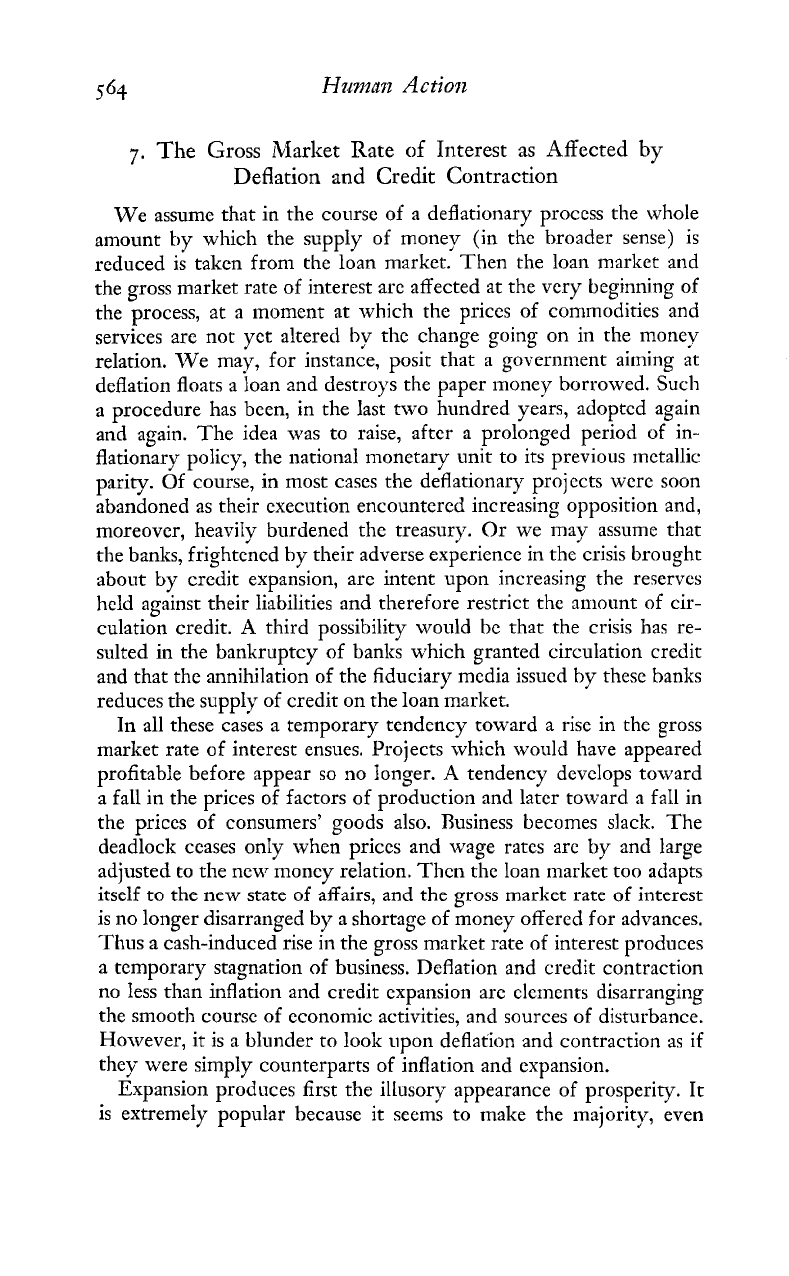
7.
The Gross Market Rate
of
Interest as Affected
by
Deflation and Credit Contraction
We assume that in the course of a deflationary process the whole
amount by which the supply of money (in the broader sense) is
reduced is taken from the loan market. Then the loan market and
the gross market rate of interest are affected at the very beginning of
the process, at a moment at which the prices of commodities and
services are not yet altered by the change going on in the money
relation. We may, for instance, posit that a government aiming at
deflation floats a loan and destroys the paper money borrowed. Such
a procedure has been, in the last two hundred years, adopted again
and again. The idea was to raise, after a prolonged period of in-
flationary policy, the national monetary unit to its previous ~netallic
parity. Of course, in most cases the deflationary projects were soon
abandoned as their execution encountered increasing opposition and,
moreover, heaviIy burdened the treasury. Or we may assume that
the banks, frightened by their adverse experience in the crisis brought
about by credit expansion, are intent upon increasing the reserves
held against their liabilities and therefore restrict the amount of cir-
culation credit.
A
third possibility would be that the crisis has re-
sulted in the bankruptcy of banks which granted circulation credit
and that the annihilation of the fiduciary media issued by these banks
reduces the supply of credit on the loan market.
In all these cases a temporary tendency toward a rise in the gross
market rate
of
interest ensues. Projects which would have appeared
profitable before appear so no longer.
A
tendency develops toward
a fall in the prices of factors of production and later toward a fall in
the prices of consumers' goods also. nusiness becomes slack. The
deadlock ceases only when prices and wage rates are
by
and large
adjusted to the new money relation. Then the loan market too adapts
:&--I1
&-
&LA
------
-La&-
-1
...=I-:--
--A
&L-
-----
---I--&
-1
:-&
----&
lL3Gll LU LUG llC
W
bLdLG U1 Illdll3, 2lIICL L11G 81UZb IlJdlKGL IdLC UI 1IILClGbL
is no longer disarranged by a shortage of money offered for advances.
Thus a cash-induced rise
in
the gross market rate of interest produces
a temporary stagnation of business. Deflation and credit contraction
no less than inflation and credit expansion are ele~nents disarranging
the smooth course of economic activities, and sources of disturbance.
However, it is a blunder to look upon deflation and contraction as if
they were simply counterparts of inflation and expansion.
Expansion produces first the illusory appearance of prosperity. It
is extremely popular because it seems to make the majority, even
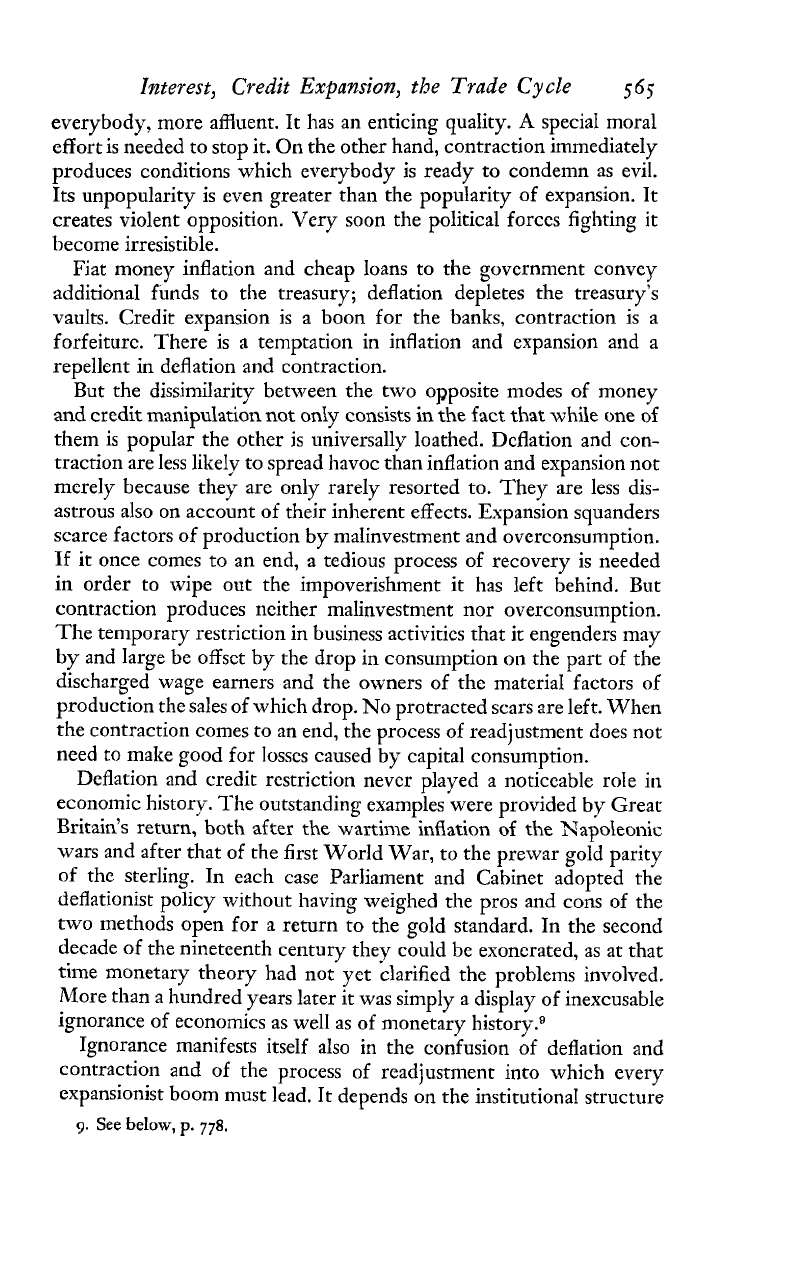
Interest, Credit Expansion, the Trade Cycle
565
everybody, more affluent. It has an enticing quality.
A
special moral
effort is needed to stop it. On the other hand, contraction immediately
produces conditions which everybody is ready to condemn as evil.
Its unpopularity is even greater than the popularity of expansion. It
creates violent opposition. Very soon the ~olitical forces fighting it
become irresistible.
Fiat: money inflation and cheap loans to the government convey
additional funds to the treasury; deflation depletes the treasury's
vaults. Credit expansion is a boon for the banks, contraction is a
forfeiture. There is
a
temptation in inflation and expansion and a
repellent in deflation and contraction.
But the dissimilarity between the two opposite modes of money
and credit manipulation not only consists in the fact that while one of
them is popular the other is universally loathed. Deflation and con-
traction are less likely to spread havoc than inflation and expansion not
merely because they are only rarely resorted to. They are less dis-
astrous also on account of their inherent effects. Expansion squanders
scarce factors of production by malinvestment and overconsumption.
If it once comes to an end,
a
tedious process of recovery is needed
in order to wipe out the impoverishment it has left behind. But
contraction produces neither malinvestment nor overconsumption.
The temporary restriction
in
business activities that it engenders may
by and large be offset by the drop in consumption on the part of the
discharged wage earners and the owners of the material factors of
production the sales of which drop. No protracted scars are left. When
the contraction comes to an end, the process of readjustment does not
need to make good for losses caused by capital consumption.
Deflation and credit restriction never played a noticeable role in
economic history. The outstanding examples were provided by Great
Britain's return, both after the wartime inflation of the Napoleonic
wars and after that of the first World War, to the prewar gold parity
of the sterling. In each case Parliament and Cabinet adopted the
deflationist policy without having weighed the pros and cons of the
two
neth hods
open for a return to the gold standard. In the second
decade of the nineteenth century they could
be
exonerated, as at that
time monetary theory had not yet 'clarified the problems involved.
More than a hundred years later it was simply a display of inexcusable
ignorance of economics as well as of monetary 11istorp.~
Ignorance manifests itself also in the confusion of deflation and
contraction and of the process of readjustment into which every
expansionist boom must lead. It depends on the institutiona1 structure
9.
See
below,
p.
778.
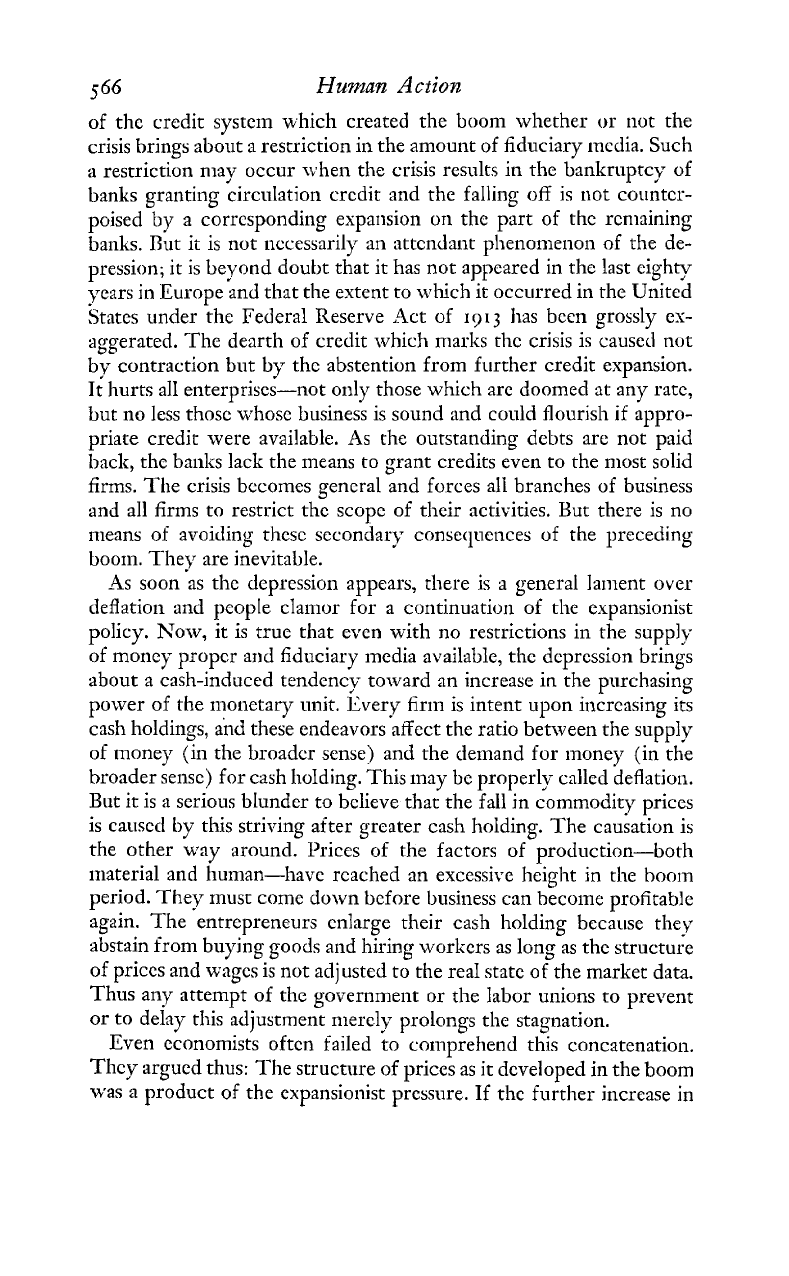
5
66
Human Action
of thc credit system which created the boom whether or not the
crisis brings about
a
restriction in the amount of fiduciary media. Such
a
restriction may occur svhen the crisis result5 in the bankruptcy of
banks granting circulation credit and the falling
off
is not counter-
poised
by
a corresponding expansion on thc part of thc remaining
banks. But it is not
necessarily
an attendant phenomenon of the de-
pression; it is beyond doubt that it has not appcared in the last eighty
years in Europe and that the extent to which it occurred in the United
States under the Federal Reserve Act of
1913
has been grossly ex-
aggerated. The dearth of credit which marks thc crisis is caused not
by contraction but by the abstention from further credit expansion.
It hurts all enterprise;-not only those which are doomed at any ratc,
but no less those whose business is sound and could flourish if appro-
priate credit were available. As the outstanding debts are not paid
back, the banks lack the means to grant credits even to the most solid
firms. The crisis becomes general and forces all branches of business
and all firms to restrict the scopc of their activities. But there is no
means of avoiding these secondary consequences of the preceding
boom. They are inevitable.
As soon as the depression appears, there is a general lament over
deflation and people clamor for a continuation of the expansionist
policy. Now, it is truc that even with no restrictions in the supply
of money propcr and fiduciary media a\iailable, thc depression brings
about a cash-induced tendency toward an increase in the purchasing
power of the monetary unit. Every firm is intent upon increasing its
cash holdings, and these endeavors affect the ratio between the supply
of
money (in the broader sense) and the demand for money (in the
broader sense) for cash holding. This may bc properly called deflation.
But
it
is
a serious blunder to bclieve that the fall
in
commodity prices
is causccl by this striving after greater cash holding. The causation is
the other way around. Prices of the factors of production-both
material and human-have rcached an excessive height in the boom
period. They must come down before business can become profitabie
again. The entrepreneurs enlarge their cash holding because they
abstain from buying goods and hiring workcrs
as
long as the structurre
of priccs and wages is not adjusted to the real state of the market data.
Thus any attempt of the government or the labor unions to prevent
or to delay this adjustment merely prolongs the stagnation.
Even cconomists often failed to comprehend this concatcnation.
Thcy argued thus: The structure of prices as
it
developed in the boom
was a product of the expansionist
pressure.
If the further increase in
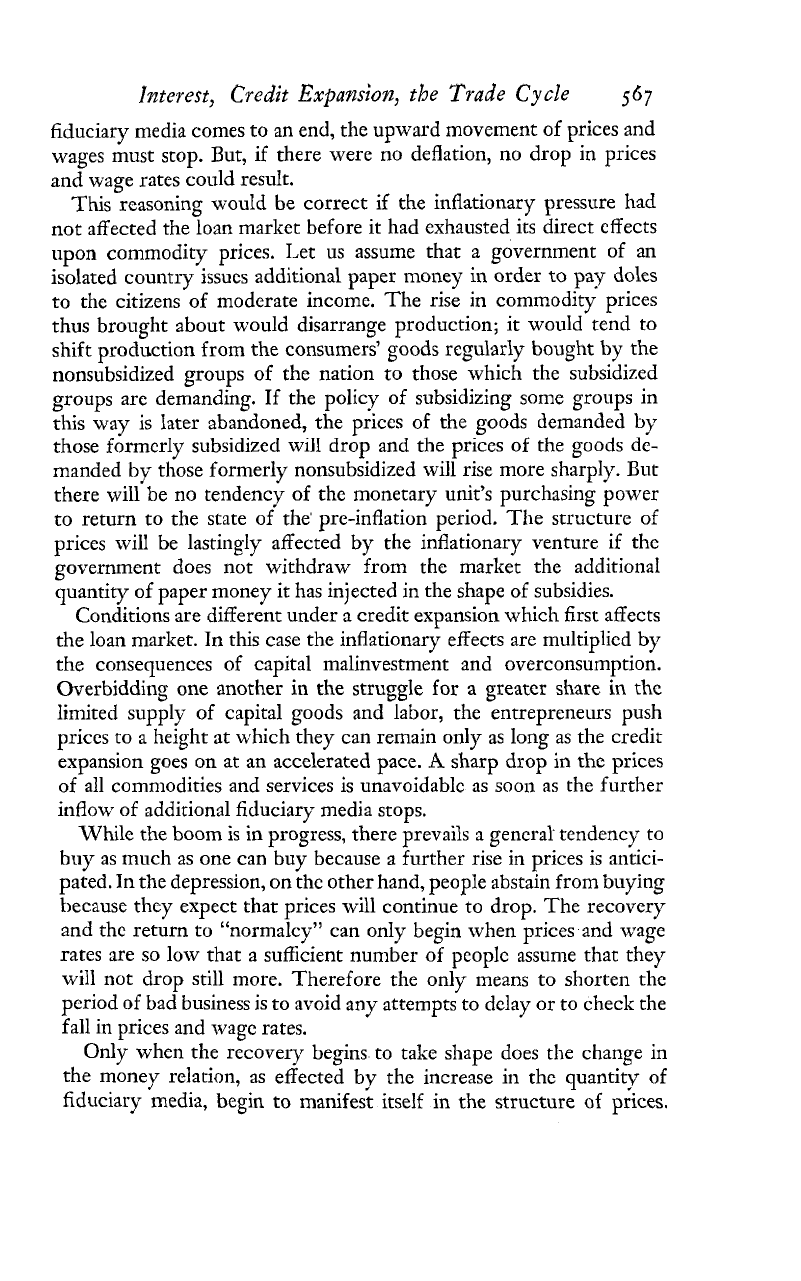
Interest, Credit Expansion, the Trade Cycle
567
fiduciary media comes to an end, the upward movement of prices and
wages must stop. But, if there were no deflation, no drop in prices
and wage rates co~dd result.
This reasoning would be correct if the inflationary pressure had
not affected the loan market before it had exhausted its direct effects
upon commodity prices. Let us assume that
a
government of
an
isolated country issues additional paper money in order to
pay
doles
to the citizens of moderate income. The rise in commodity prices
thus brought about would disarrange production; it would tend to
shift production from the consumers' goods regularly bought
by
the
nonsubsidized groups of the nation to those which the subsidized
groups are demanding. If the policy of subsidizing some groups in
this way is later abandoned, the prices of the goods demanded by
those formerly subsidized will drop and the prices of the goods de-
manded
by
those formerly nonsubsidized will rise more sharply. But
there will be no tendency of the monetary unit's purchasing power
to return to the state of the' pre-inflation period. The structure of
prices will be lastingly affected by the inflationary venture if the
government does not withdraw from the market the additional
quantity of paper money it has injected in the shape of subsidies.
Conditions are different under a credit expansion which first affects
the loan market. In this case the inflationary effects are multiplied by
the consequences of capital malinvestment and overconsumption.
Overbidding one another in the struggle for a greater share
in
the
limited supply of capital goods and labor, the entrepreneurs push
prices to a height at which they can remain only as long as the credit
expansion goes on at an accelerated pace.
A
sharp drop
in
the prices
of all comnlodities and services is unavoidable as soon as the further
inflow of additional fiduciary media stops.
While the boom is in progress, there prevails
a
general tendency to
buy as much as one can buy because a further rise in prices is antici-
pated. In the depression, on the other hand, people abstain from buying
because they expect that prices will continue to drop. The recovery
and the return to "normalcy" can only begin when prices and wage
rates are so low that a sufficient number of peoplc assume that they
will not drop still more. Therefore the only means to shorten the
period of bad business is to avoid any attempts to delay or to check the
fall in prices and wage rates.
Only when the recovery begins to take shape does the change in
the money relation, as effected by the increase in the quantity of
fiduciary media, begin
to
manifest itself in the structure
of
prices.
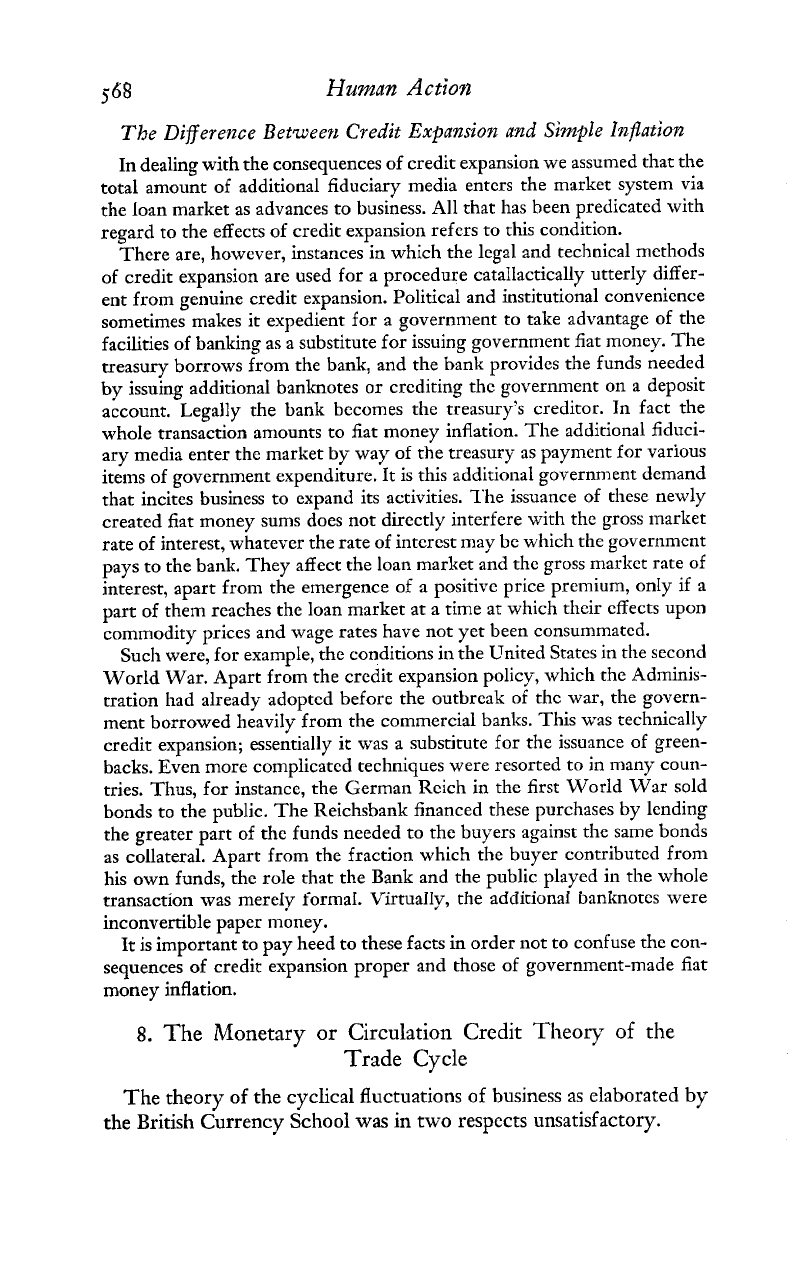
j68
Human
Action
The
Difference Between Credit Expansion and Simple Inflation
In dealing with the consequences of credit expansion we assumed that the
total amount of additional fiduciary media enters the market system via
the loan market as advances to business. All that has been predicated with
regard to the effects of credit expansion refers to this condition.
There are, however, instances in which the legal and technical methods
of credit expansion are used for a procedure catallactically utterly differ-
ent from genuine credit expansion. Political and institutional convenience
sometimes makes it expedient for a government to take advantage of the
facilities of banking as a substitute for issuing government fiat money. The
treasury borrows from the bank, and the bank provides the funds needed
by issuing additional banknotes or crediting the government on a deposit
account. Legally the bank becomes the treasury's creditor. In fact the
whole transaction amounts to fiat money inflation. The additional fiduci-
ary media enter the market by way of the treasury as payment for various
items of government expenditure. It is this additional government demand
that incites business to expand its activities. The issuance of these newly
created fiat money sums does not directly interfere with the gross market
rate of interest, whatever the rate of interest may be which the government
pays to the bank. They affect the loan market and the gross market rate of
interest, apart from the emergence of a positive price premium, only if a
part of them reaches the loan market at a time at which their effects upon
commodity prices and wage rates have not yet been consumrnatcd.
Such were, for example, the conditions in the United States in the second
World War. Apart from the credit expansion policy, which the Adminis-
tration had already adopted before the outbreak of the war, the govern-
ment borrowed heavily from the commercial banks. This was technically
credit expansion; essentially it was a substitute for the issuance of green-
backs. Even more complicated techniques were resorted to in many coun-
tries. Thus, for instance, the German Reich in the first World War sold
bonds to the public. The Reichsbank financed these purchases by lending
the greater part of the funds needed to the buyers against the same bonds
as collateral. Apart from the fraction which the buyer contributed from
his own funds, the roIe that the Bank and the public played in the whoIe
transaction was mereiy formal. Virtuaily, the adciitionai banknotes were
inconvertible paper money.
It is important to pay heed to these facts in order not to confuse the con-
sequences of credit expansion proper and those of government-made fiat
money inflation.
8.
The
Monetary
or
Circulation
Credit
Theory
of
the
Trade
Cycle
The theory of the cyclical fluctuations of business as elaborated by
the
British
Currency School
was
in
two
respects
unsatisfactory.
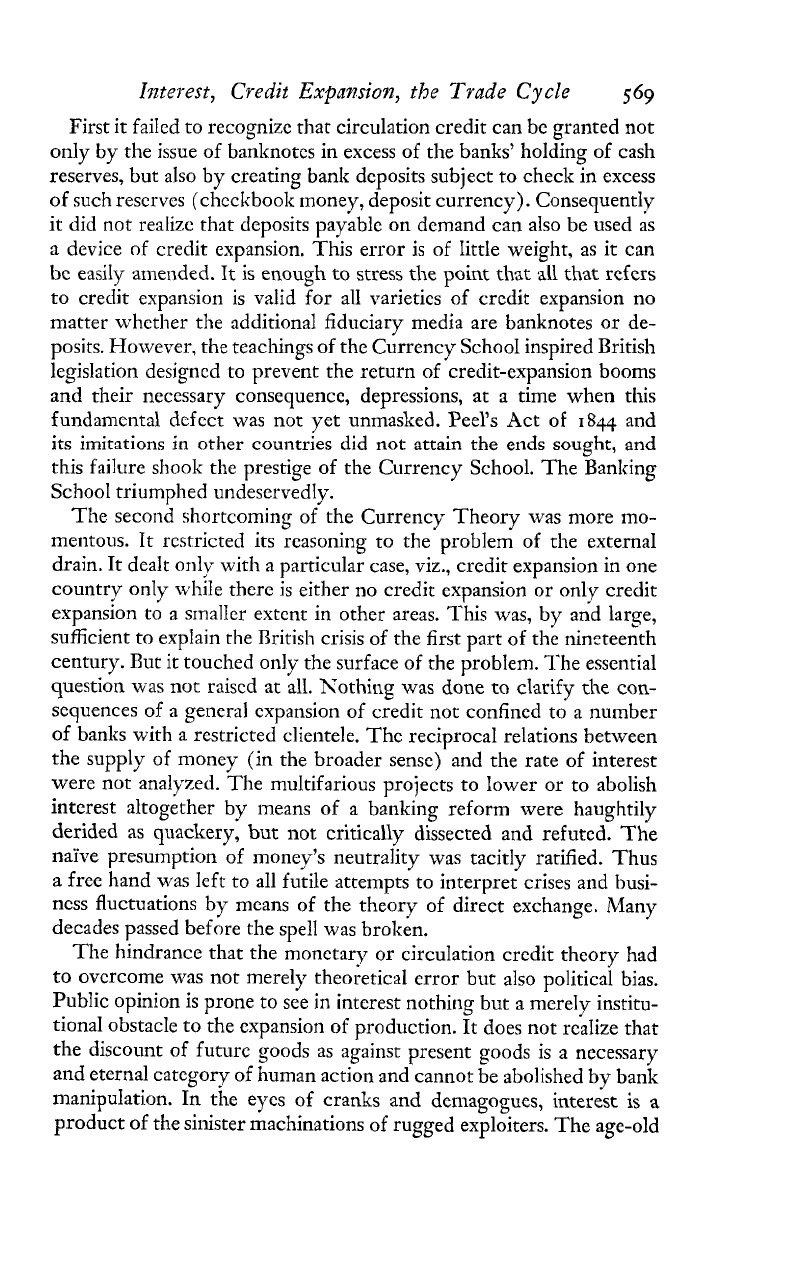
Inte~est, Credit Expansion,
the
Trade Cycle
569
First it faiIed to recognize that circulation credit can be granted not
only by the issue of banlmotcs in excess of the banks' holding of cash
reserves, but also by creating bank deposits subject to check in excess
of such reserves
(checkbook
money, deposit currency). Consequently
it did not realize that deposits payable on demand can also be used as
a device of credit expansion. This error is of little weight, as it can
be easily amended. It is enough to stress the point thxt
all
that
rcfcrs
to credit expansion is valid for all varieties of credit expansion no
matter whether the additional fiduciary media are banknotes or de-
posits. However, the teachings of the Currency SchooI inspired British
legislation
designed to prevent the rcturn of credit-expansion booms
and their necessary consequence, deprcssions, at a time when this
fundamental
dcfect was not yet unmasked. Peel's Act of
184.4
and
its imitations in other countries did not attain the ends sought, and
this failure shook the prestige of the Currency School. The Banking
School triumphed undeservedly.
The second shortcoming of the Currency Theory was more mo-
mentous. It rcstricted its reasoning to the problem of the external
drain. It dealt only with a particular case, viz., credit expansion in one
country only whiIe there is either no credit expansion or only credit
expansion to a smaller extent in other areas. This was, by and large,
sufficient to explain the British crisis of the first part of the
nineteenth
century. But it touched only the surface of the problem. The essential
question was not raised at
all.
Nothing
was
done to clarify the con-
sequences of a general expansion of credit not confined to a number
of banks with a restricted clientele. Thc reciprocal relations between
the supply of moncy (in the broader sense) and the rate of interest
werc not analyzed. The multifarious projects to lower or to abolish
interest altogether by means of a banking reform were haughtily
derided as quackery, but not critically dissected and refuted. The
nai've presumption of money's neutrality was tacitly ratified. Thus
a free hand was left to all futile attempts to interpret crises and busi-
ness fluctuations by means of the theory of direct exchange. hiany
decades passed before the spell was broken.
The hindrance that the monctary or circulation credit theory had
to ovcrcome was not merely theoietical crror but also political bias.
Public opinion is prone to see in interest nothing but a mcrely institu-
tional obstacle to the expansion of production. It does not reaIize that
the discount of future goods as against present goods is a necessary
and eternal category of human action and cannot be abolished by bank
manipulation. In tile eyes of cranks and demagogues, interest
is
a
product of the sinister machinations of rugged exploiters. The age-old
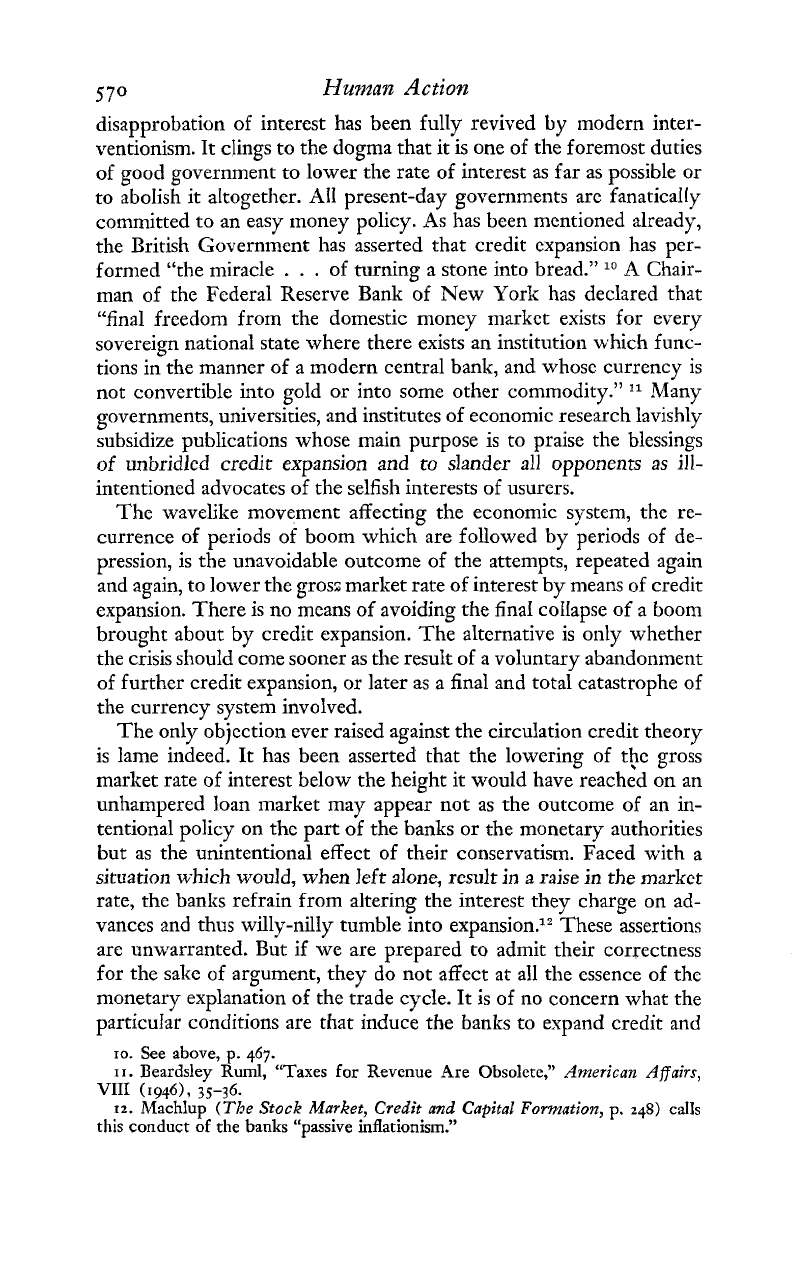
570
Human
Action
disapprobation of interest has been fully revived
by
modern inter-
ventionism. It clings to the dogma that it is one of the foremost duties
of good government to lower the rate of interest as far as possible or
to abolish it altogether. A11 present-day governments are fanatically
committed to an easy money policy. As has been mentioned already,
the British Government has asserted that credit expansion has per-
formed "the miracle
. .
.
of turning a stone into bread."
lo
A
Chair-
man of the Fcderal Reserve Bank of New York has declared that
"final freedom from the domestic money market exists for every
sovereign national state where there exists an institution which func-
tions in the manner of a modern central bank, and whose currency is
not convertible into gold or into some other commodity." Many
governments, universities, and institutes of economic research lavishly
subsidize publications whose main purpose is to praise the blessings
of unbridled credit expansion and to slander all opponents as
ill-
intentioncd advocates of the selfish interests of usurers.
The wavelike movement affecting the economic system, the re-
currence of periods of boom which are followed by periods of de-
pression, is the unavoidable outcome of the attempts, repeated again
and agin, to lower the gross market rate of interest by means of credit
expansion. There is no means of avoiding the finaI colfapse of a boom
brought about by credit expansion. The alternative is only whether
the crisis should come sooner as the result of a voluntary abandonment
of further credit expansion, or later as a final and total catastrophe of
the currency system involved.
The only objection ever raised against the circulation credit theory
is lame indeed. It has been asserted that the lowering of
t+
gross
market rate of interest below the height it would have reached on an
unhampered loan market may appear not as the outcome of an in-
tentional policy on the part of the banks or the monetary authorities
but as the unintentional effect of their conservatism. Faced with a
situation which would, when left alone, result in
a
raise
in
the
market
rate, the banks refrain from altering the interest they charge on ad-
vances and thus willy-nilly tumble into expansion.12 These assertions
are unwarranted. But if we are prepared to admit their correctness
for the sake of argument, they do not affect at all the essence of the
monetary explanation of the trade cycle. It is of no concern what the
particuIar conditions are that induce the banks to expand credit and
10.
See above, p. 467.
11.
Beardsley Ruml, "Taxes
for
Revenue Are Obsolete,"
American Affairs,
VIII
(1946), 35-36.
12.
Machlup
(The Stock Market,
Credit
and
Capital Formation,
p.
248) calls
this
conduct of
the
banks "passive inflationism."
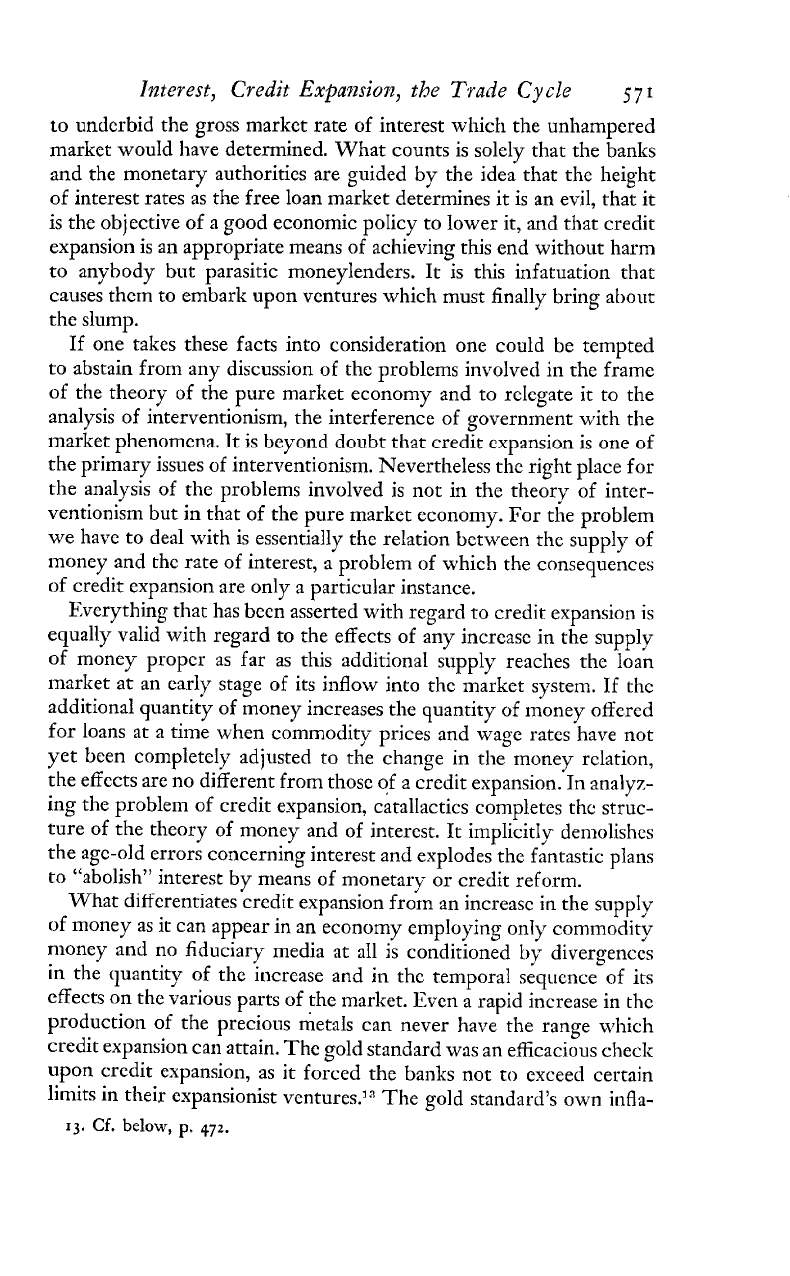
Interest, Credit Expansion,
the
Trade
Cycle
571
to underbid the gross market rate of interest which the unhampered
market would have determined. What counts is solely that the banks
and the monetary authorities are guided by the idea that the height
of interest rates as the free loan market determines it is an evil, that it
is the objective of a good economic poIicy to lower it, and that credit
expansion is an appropriate means of achieving this end without harm
to anybody but parasitic moneylenders. It is this infatuation that
causes them to embark upon ventures which must finally bring about
the slump.
If
one takes these facts into consideration one could be tempted
to abstain from any discussion of the problems involved in the frame
of the theory of the pure market economy and to relegate it to the
analysis of interventionism, the interference of government with the
market phenomena. It is beyond doubt that credit expansion is one of
the primary issues of interventionism. Nevertheless the right place for
the analysis of the problems involved is not in the theory of intcr-
ventionism but in that of the pure market economy. For the problem
we have to deal with is essentially the relation between the supply of
money and the rate of interest, a problcm of which the consequences
of credit expansion are only a particular instance.
Everything that has been asserted with regard to credit expansion is
equally valid with regard to the effects of any increase in the supply
of money proper as far as this additional supply reaches the loan
rnarltet at an early stage of its inflow into the market system. If the
additional quantity of money increases the quantity of money offered
for loans at a time when commodity prices and wage rates have not
yet been
completely
adjusted to the change in the money relation,
the effects are no different from those of a credit expansion.
In
analyz-
ing the problem of credit expansion, c~tallactics completes thc struc-
ture of the theory of money and of interest. It implicitly demolishes
the age-old errors concerning interest and explodes the fantastic plans
to "abolish" interest by means of monetary or credit reform.
what differentiates credit expansion from an increase in the suppIy
of money as it can appear in an economy employing only commodity
money and no fiduciary media at a11 is conditioned
by
divergences
in the quantity of the increase and
in
the temporal sequence of its
effects on the various parts of the market. Even a rapid increase in the
production of the precious metals can never have the range which
credit expansion can attain. The gold standard was an efficacious check
upon credit expansion, as it forced the banks not to exceed certain
limits in their expansionist ventures.lThe gold standard's own infla-
13.
Cf.
below,
p.
472.
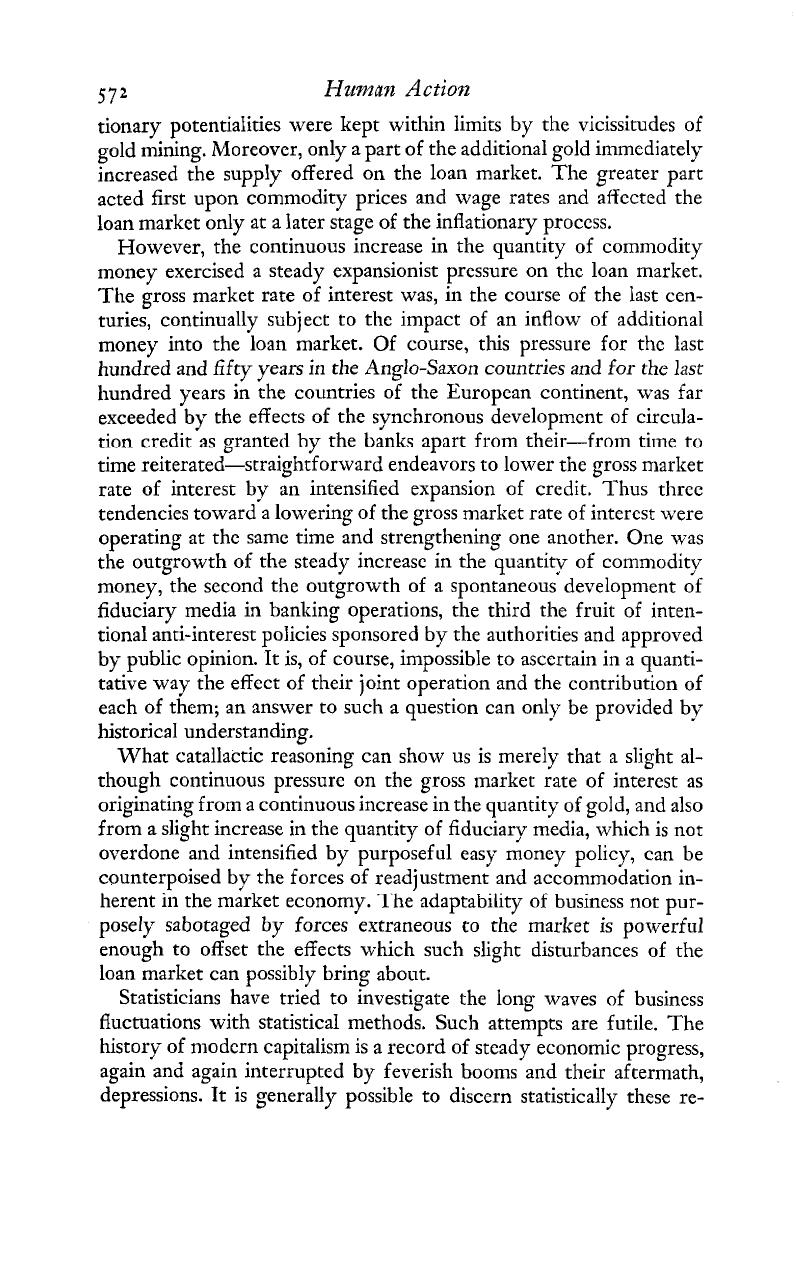
572
Human
Action
tionary potentialities were kept within limits by the vicissitudes of
gold mining. Moreover, only a part of the additional gold immediately
increased the supply offered on the loan market. The greater part
acted first upon commodity prices and wage rates and affected the
loan market only at a later stage of the inflationary process.
However, the continuous increase in the quantity of commodity
money exercised a steady expansionist pressure on the loan market.
The gross market rate of interest was, in the course of the last cen-
turies, continually subject to the impact of an inflow of additional
money into the loan market. Of course, this pressure for the last
hundred and fifty years in the Anglo-Saxon countries
and
for
the
last
hundred years in the co~~ntries of the European continent, was far
exceeded by the effects of the synchronous development of circula-
tion credit as granted by the banks apart from their-from time to
time reiterated-straightforward endeavors to lower the gross market
rate of interest by an intensified expansion of credit. Thus three
tendencies toward a lowering of the gross market rate of interest were
operating at the same time and strengthening one another. One was
the outgrowth of the steady increase in the quantity of commodity
money, the second the outgrowth of
a
spontaneous development of
fiduciary media in banking operations, the third the fruit of inten-
tional anti-interest policies sponsored by the authorities and approved
by public opinion. It is, of course, impossible to ascertain in a quanti-
tative way the effect of their joint operation and the contribution of
each of them; an answer to such a question can only be provided by
historical understanding.
What catallactic reasoning can show us is merely that a slight al-
though continuous pressure on the gross market rate of interest as
originating from a continuous increase in the quantity of gold, and also
from a slight increase in the quantity of fiduciary media, which is not
overdone and intensified by purposeful easy money policy, can be
counterpoised by the forces of readjustment and accommodation in-
herent in the market economy. The adaptability of business not pur-
posely sabotaged
by
forces extraneous to the market is powerful
enough to offset the effects which such slight disturbances of the
loan market can possibly bring about.
Statisticians have tried to investigate the long- waves of business
fluctuations with statistical methods. Such attempts are futile. The
history of modern capitalism is a record of steady economic progress,
again and again interrupted by feverish booms and their aftermath,
depressions. It is generally possible to discern statistically these re-
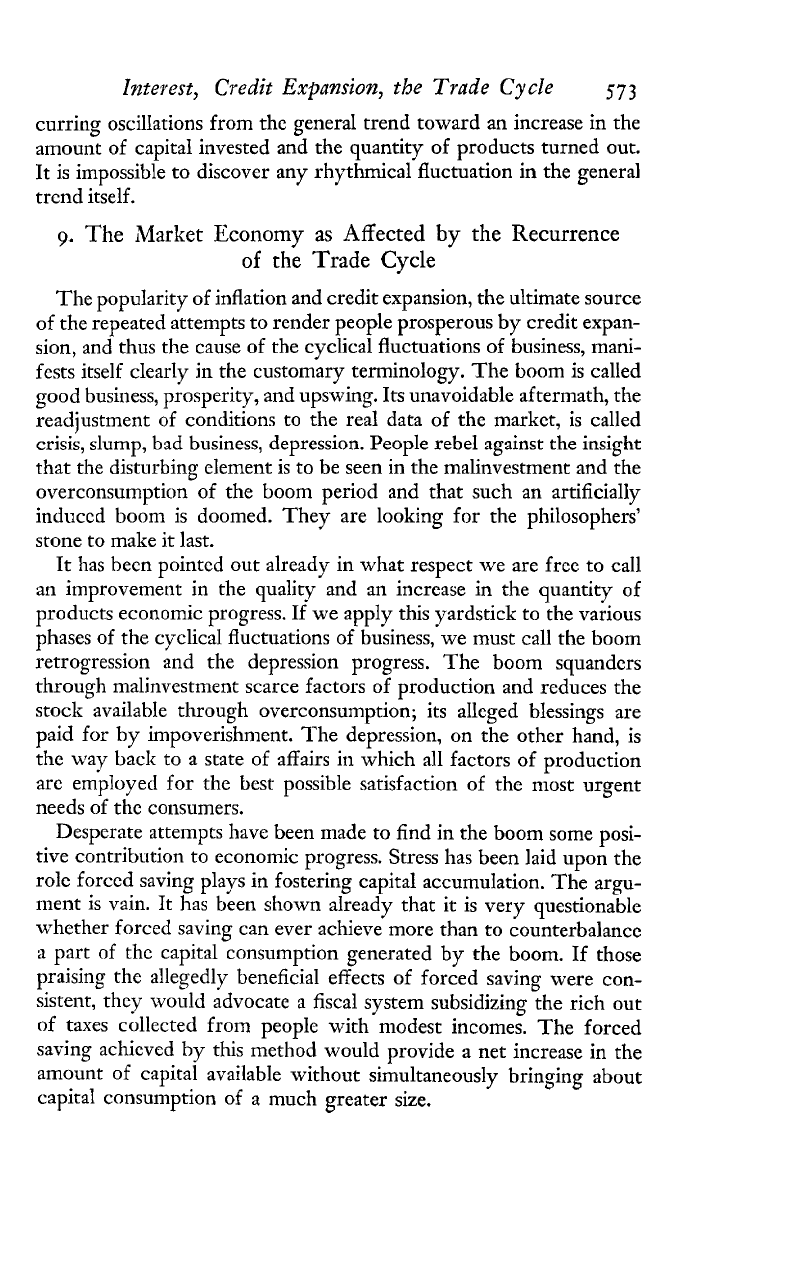
Interest, Credit Expansion, the Trade Cycle
573
curring oscilIations from the general trend toward an increase in the
amount of capital invested and the quantity of products turned out.
It is impossible to discover any rhythmical fluctuation in the general
trcnd itself.
9.
The Market Economy
as
Affected by the Recurrence
of
the Trade Cycle
The popularity of inflation and credit expansion, the ultimate source
of the repeated attempts to render people prosperous by credit expan-
sion, and thus the cause of the cyclical fluctuations of business, mani-
fests itself clearly in the customary terminology. The boom is called
good business, prosperity, and upswing. Its unavoidable aftermath, the
readjustment of conditions to the real data of the market, is called
crisis, slump, bad business, depression. People rebel against the insight
that the disturbing element is to be seen in the malinvestment and the
overconsumption of the boom period and that such an artificially
induccd boom is doomed. They are looking for the philosophers'
stone to make it last.
It has been pointed out already in what respect we are free to call
an improvement in the quality and an increase in the quantity of
products economic progress. If we apply this yardstick to the various
phases of the cyclical fluctuations of business, we must call the boom
retrogression and the depression progress. The boom squanders
through malinvestment scarce factors of production and reduces the
stock available through overconsumption; its alleged blessings are
paid for by impoverishment. The depression, on the other hand, is
the way back to a state of affairs in which all factors of production
are em$oyed for the best possible satisfaction of the most urgent
needs of the consumers.
Desperate attempts have been made to find in the boom some posi-
tive contribution to economic progress. Stress has been laid upon the
role forced saving plays in fostering capital accumulation. The argu-
ment is vain. It has been shown already that it is very questionable
whether forced saving can ever achieve more than to counterbalance
a
part of the capital consumption generated by the boom. If those
praising the allegedly beneficial effects of forced saving were con-
sistent, they would advocate a fiscal system subsidizing the rich out
of taxes cbllected from peoplc with modest incomes. The forced
saving achieved by this method would provide a net increase in the
amount of capital available without simultaneously bringing about
capital consumption of a much greater size.
